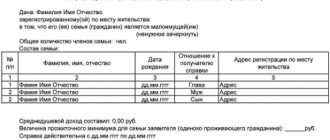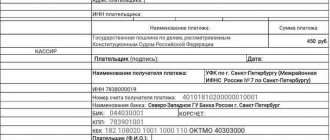“The Constitutional Court allowed the only housing to be taken away for debts,” screamed the media headlines, creating the impression that already in 2021 Russians will begin to be deprived of their housing en masse and simply thrown out onto the street.
In fact, Resolution of the Constitutional Court of the Russian Federation of April 26, 2021 No. 15-P, which is in question, most likely will not affect typical debtors who thoughtlessly took out loans and live in average apartments. Or rather, such borrowers will have to try hard to ensure that their case falls under the Resolution of the Constitutional Court of the Russian Federation.
But unscrupulous debtors who bought expensive real estate, hoping that “the only home will not be taken away if it is not mortgaged,” may have a hard time. Their creditors now have hope of getting their money back.
How did the story of the confiscation of the debtor’s only home begin?
There was a debt . The debtor owed the creditor. Both are individuals.
In 1999, a court of general jurisdiction decided to recover 772,500 rubles from the debtor in favor of the creditor. As often happens, the court decision on collection remained on paper - the debtor paid in part, most of the debt remained outstanding. Enforcement proceedings were initiated in 2006. It is unclear from the Constitutional Court ruling why the decision on collection was made in 1999, and enforcement proceedings began only in 2006, but this is not important for this case.
In 2009, the debtor buys an apartment with an area of 110 square meters. The price of the apartment far exceeded the amount of debt. Subsequent legal battles unfolded over this particular apartment.
In 2021, the creditor applied to the court for indexation of the debt, and the court indexed the debt. 772,500 rubles turned into 3.9 million rubles.
In 2021, the debtor became bankrupt. The creditor entered the register of creditors' claims and demanded that the apartment be included in the bankruptcy estate and sold at auction. The financial manager and the courts fought to the death - this apartment is the debtor’s only home, it is not pledged, and therefore it cannot be included in the bankruptcy estate. Article 446 of the Civil Procedure Code directly prohibits this, and the Supreme Court spoke on this topic in Resolution of the Plenum of December 25, 2018 No. 48 - the executive immunity of a single residence also applies in bankruptcy.
The creditor's argument that it is not good to buy an expensive apartment when you are in debt for enforcement proceedings did not impress the judges.
In January 2021, the Supreme Court did not accept the creditor's complaint, and it went to the Constitutional Court.
Arbitrage practice
The violation committed by the borrower must be insignificant compared to the total volume of obligations. If the mortgage borrower has been paying the debt in good faith for several years before the onset of financial difficulties, then for 2-3 delays according to the schedule he will not be deprived of his apartment. The Supreme Court of the Russian Federation adheres to this position.
On the other hand, the courts, when considering a claim against the mortgagor, take into account the circumstances of the particular case. In practice, there are cases when the delay according to the schedule is longer, and the amount of outstanding obligations is more than 25% of the value of the property, but the court takes the side of the defendant - the borrower, and refuses the bank to foreclose on the apartment in court.
Information sources:
- Article 446 of the Code of Civil Procedure of the Russian Federation - link.
- Article 54.1 of the Federal Law “On Mortgage (Pledge of Real Estate)” - link.
about the author
Irina Rusanova - higher education at the International East European University in the direction of "Banking". Graduated with honors from the Russian Economic Institute named after G.V. Plekhanov with a major in Finance and Credit. Ten years of experience in leading Russian banks: Alfa-Bank, Renaissance Credit, Home Credit Bank, Delta Credit, ATB, Svyaznoy (closed). He is an analyst and expert of the Brobank service on banking and financial stability. [email protected]
Is this article useful? Not really
Help us find out how much this article helped you. If something is missing or the information is not accurate, please report it below in the comments or write to us by email
The right to housing and its inviolability does not mean that the only housing cannot be taken away
The Constitutional Court said: there is a constitutional right to housing and its inviolability. People have a need for housing “sufficient for a decent existence.” And the constitutional right to housing is needed in order to guarantee citizens and members of their families “the maintenance of housing at a level sufficient for a decent existence” and no more. The right to housing does not mean that the debtor’s housing situation cannot worsen under any circumstances.
Therefore, the ban on the collection of the only housing is necessary to guarantee the debtor and his family members acceptable living conditions, “satisfying a person’s reasonable need for housing.”
In itself, the prohibition on foreclosure of the only dwelling does not mean that the debtor’s living conditions cannot worsen. They may get worse.
And even more so, they can get worse if the debtor systematically does not pay his debts, with the total amount of the debt clearly disproportionate to the debtor’s property status. We believe that the court had in mind a situation where the amount of debt is much less than the real estate that the debtor bought. Moreover, this property clearly exceeds what is necessary (for example, the debtor lives alone in a 5-room apartment).
What not to do with seized items
During the seizure of property, you cannot dispose of it. It is optionally withdrawn or the right to use it is limited. Transactions that alienate seized property are insignificant to the extent that they provide for the disposal of such things.
A transaction that violates the ban on the disposal of the debtor’s property mass, imposed in court or other legal order in favor of his creditor or other authorized person, does not interfere with the exercise of the rights of this creditor or other authorized person, which were secured by the ban.
An exception is if the purchaser of the property did not know and should not know about the prohibition. This is stated in Art. 174.1 Civil Code; Art. 6 and 80 229-FZ.
Paragraph 43 of the Resolution of the Plenum of the Supreme Court No. 50 of November 17, 2015 states that arrest as an interim measure or a ban on disposal is also established for property that cannot be foreclosed on under the Civil Procedure Code. In particular, for the only premises suitable for living and the land plot on which it is located. For example, the actions of the bailiff are legal when he prohibits the disposal of such premises and land, including a ban on the occupancy and registration of other persons, if these measures are taken by the bailiff to prevent the debtor from disposing of this property to the detriment of the interests of the claimant.
Why exactly can a debtor's only home be taken away?
Due to abuses in its purchase. What is considered abuse? In our opinion, the Constitutional Court had in mind such actions of the debtor, from which it is clear that he sought to buy housing because he believed that it was protected by immunity. For example, he sold other property, shares in ownership, and saved the proceeds to buy a single home, because it is protected from foreclosure, but the sold property is not.
In this case, the courts must clarify the following questions:
- when a court decision was made to collect the debt from the debtor
- when enforcement proceedings were initiated
- whether the debtor knew about these events
- if the debtor sold property that is not protected by executive immunity, then when did he do it
- when he bought the disputed property.
It is clear that if a debtor bought a home, knowing full well about the courts regarding his debt, about enforcement proceedings, but instead of paying off the debts, he bought an apartment, then it is difficult to call such behavior conscientious.
If the apartment has a mortgage
A separate case is mortgage housing. Such an apartment is initially pledged to the bank, which issued money for its purchase. If the borrower stops paying the loan, the bank will put the apartment up for sale to get their money back, explains lawyer, real estate and bankruptcy expert Igor Zinevich.
At the same time, no one will provide the family with other housing in return.
Save money to avoid getting into a difficult financial situation.
Savings can be kept in a deposit account and receive interest
What else important did the Constitutional Court say in Resolution No. 15-P of April 26, 2021
An assessment of the market value of the disputed residential premises is desirable or even mandatory
. Moreover, creditors must apply for this. Probably, without such an assessment, the chances of creditors to collect the only housing will tend to zero.
It is necessary to assess the ratio of debt and market value of housing
. The purpose of selling a home is to pay off the debt, at least in significant part. The court did not specify which part was considered essential.
Selling your only home is not a punishment
for unpaid debts and not a means of intimidating the debtor.
Reasons for eviction
Next, we will take a closer look at the reasons and grounds under which a person can be cheerful from his only living space. If this is official housing, then the grounds will be as follows :
- Termination of the employment contract, termination of any relationship between the owner and the tenant on the basis of which the office premises were provided.
- Change of owner of service housing, in which the new owner does not have any labor relations with the tenant and, in fact, does not owe him anything (Clause 2 of Article 102 of the Housing Code of the Russian Federation).
- Debt to pay for utilities, damage to property, use of premises for other purposes (clauses 1-4, part 4, article 101 of the RF Housing Code, clause 1, article 103 of the RF Housing Code).
If the housing is municipal, the reasons for eviction may be:
- Constant violations of the rights and interests of neighbors (clause 3, part 4, article 83 of the Housing Code of the Russian Federation).
- Failure to comply with the terms of the social tenancy agreement - unsanitary conditions, damage to municipal property, non-payment of utilities (Part 3 of Article 67 of the Housing Code of the Russian Federation, Article 86 of the Housing Code of the Russian Federation, clause 2 of Part 3 and Part 4 of Article 79 of the Housing Code of the Russian Federation). If, for these reasons, the tenant refuses to move out voluntarily, in accordance with Part 5 of Art. 79 Housing Code of the Russian Federation and Art. 91 of the Housing Code of the Russian Federation, they have the right to forcibly evict him without providing other housing.
- Recognition of housing as unsafe, dangerous for further residence, as well as transfer of its ownership to religious organizations. According to Article 85 of the Housing Code of the Russian Federation, eviction on these grounds will be carried out, even if the tenant has only one home. At the same time, they are required to provide him with other living space.
For more information about the reasons for eviction, see the video below:
If the only housing is taken away, will the debtor and his family simply be thrown out onto the street?
No.
The Constitutional Court indicated that the debtor and his family members must have housing, and it must satisfy several conditions:
- living in it does not detract from the dignity of the debtor and his family;
- the area of housing into which the debtor is relocated cannot be less than according to social rent standards;
- the new housing must be in the same locality where the seized one was (but if the debtor does not mind, then it is possible in another locality).
What are the social rent standards? This is the minimum living area per person when concluding a social tenancy agreement . The size of the minimum area is set by local administrations or regional authorities. For example, in Moscow the standard for providing space is 18 square meters. for one person.
Where will the new housing come from when the old, “too luxurious” one is taken away? The Constitutional Court said the issue could be decided by the courts on a case-by-case basis and that the creditor may have to provide housing to the debtor. But in these matters, the Constitutional Court of the Russian Federation leaves the courts freedom of action: the courts can decide for themselves how to provide the debtor with housing.
Moreover, Resolution No. 15-P does not say that the creditor is obliged to provide the debtor with new housing on the right of ownership. The court said “the creditor (collector) provides the citizen-debtor in the manner established by the court.” We assume that the debtor will buy an apartment with the proceeds from the sale of the “luxury” apartment. It is unlikely that the debtor will be moved to rented housing on social rent, but it is better to wait for judicial practice.
How to seize a debtor's belongings
When the claimant declares a desire to seize the debtor's things, the bailiff decides whether to grant this request or refuse. The decision is made no later than the day following the day of filing such an application.
5 days is the period for voluntary repayment, then an enforcement fee is charged in the amount of 7% of the debt amount, but not less than 1,000 rubles. This is established in Part 3 of Art. 112 229-FZ. The debtor pays the enforcement fee, but to the federal budget. After this, the bailiffs search for the property mass and regularly visit the defaulter.
Here is the algorithm for how bailiffs seize property:
- They visit the debtor at his place of registration to serve a resolution to initiate enforcement proceedings.
- They inspect the property in the apartment to assess whether it is confiscated or not.
- An inventory of the seized items is drawn up in the presence of witnesses who sign this act. The bailiff notes what prohibition he imposes on things, who is present when he describes things and other essential information. In parts 4–7 art. 80 229-FZ states that only attesting witnesses must be present, nothing is said about the debtor, therefore, seizure of property without the participation of the debtor is possible, provided that he was properly notified of enforcement actions.
In Part 4 of Art. 80 states that the type, volume and period of restriction of the right to use the property mass are determined by the bailiff in each case, taking into account the properties of the property, its significance for the owner or possessor, the nature of its use, which the bailiff makes a note about in the resolution or act of seizure of the debtor’s things ( inventory of property). Therefore, to the question of whether it is legal to seize property without drawing up an act, we answer in the negative; this contradicts the law on enforcement proceedings.
List of documents that record the seizure of property by bailiffs for the debts of the debtor:
- arrest order;
- act of inventory and seizure of things;
- act of seizure, etc.
Participants in the inventory sign the act and provide explanations if they wish. The next day, the resolution and a copy of the inventory are handed over to the participants and sent to the authorities that control arrests (traffic police, Rosreestr, etc.).
The debtor has the right to express a desire to independently sell the things that are seized. He informs the bailiffs of this desire within 10 days after arrest. This is indicated in Part 1 of Art. 87.1 229-FZ.
The bailiff seizes and restricts the disposal of the property specified by the court. If the court took an interim measure in the form of seizure of the defendant’s property and established only its total value, then the specific composition of the seized property and the types of restrictions are determined by the bailiff according to the rules of Art. 80 229-FZ.
What do bailiffs do with seized property?
- transferred to a specialized organization for sale at auction under Part 1 of Art. 87 229-FZ;
- transferred to government agencies and organizations in order to transfer them into state ownership (for property that is seized under a judicial act of confiscation) within the framework of Part 2 of Art. 87 229-FZ;
- sold at auction in the form of an auction (for real estate and things worth more than 500 thousand rubles) within the framework of Part 3 of Art. 87 229-FZ.
Can bailiffs take away your only home because of a debt to the bank?
The Constitutional Court considered a case in which the debtor went bankrupt. When an arbitration court declares a debtor bankrupt, bailiffs terminate enforcement proceedings, and debt collection becomes possible only through bankruptcy proceedings. Bailiffs do not deal with bankrupt debtors.
But nonetheless,
nothing prohibits bailiffs from using the mechanism described by the Constitutional Court and seizing the only home for debts.
But to do this, the bailiffs will have to prove that there are grounds for seizure: order a cost assessment, prove abuses, study how the dates of sale of other property and the date of purchase of housing relate, justify why housing clearly exceeds what is necessary, etc.
As a rule, bailiffs are not motivated enough to do such a volume of work. They are not collecting their own money from the debtor. But it is possible that some creditors will in every possible way force the bailiffs to at least try to seize the debtor’s only home, relying on Resolution No. 15.
Let's sum it up
The only housing, as a rule, cannot be the subject of foreclosure: it is not sold at auction to satisfy the needs of the creditor, since this would violate the citizen’s constitutional right to housing. However, if such housing is the subject of a pledge, or the court considers that its area exceeds the minimum required for living, then in such cases the sale is allowed. In other cases, real estate is used as part of enforcement proceedings in accordance with the general procedure.
Read: Can a creditor challenge a sale of property by a debtor?
Conclusions about the risks and opportunities for foreclosure of a single home
The rule “the only housing is not taken away for debts” is no longer as “reinforced concrete” as it used to be .
Now the debtor risks losing his only home. The court may decide to confiscate the only home if it decides that the debtor acted in bad faith, abused the right and at the same time the debt hung on the debtor . Moreover, the market value of the housing purchased by the debtor indicates that the debtor had the opportunity to repay the debt, and the housing itself is clearly larger and more luxurious than reasonably necessary.
Some creditors have opportunities to collect debts that were previously impossible to collect due to the fact that the debtor has no property other than a single home.
The risk of losing your home arises not only in bankruptcy proceedings, but also in “ordinary” enforcement proceedings , which are handled by the bailiff service. The creditor in such cases can be either a citizen or a legal entity, for example, a bank.
For whom is this impossible?
If the official housing is the only one, you cannot evict from it:
- spouses and minor children of a person who died in the performance of official duties (you can find out whether minor children can be evicted from residential premises here);
- disabled people of groups 1 and 2, if the disability was acquired during the performance of official obligations;
- old age pensioners.
You can't evict from public housing:
- minor orphans;
- residents with dependent children and disabled people;
- a person recognized as disabled since childhood;
- people with mental illness;
- citizens who do not have the opportunity to find a job for reasons beyond their control.
For more information about who cannot be evicted from an apartment, see the video below:
Providing alternative living space
Basically, government provision of alternative housing occurs upon eviction from municipal housing . This is possible in the following cases:
- A person is evicted for utility debts, but in court, he proves that they arose for reasons beyond his control (serious illness, loss of job). They can evict him from his only housing only if he is provided with an alternative, for example, they will offer him a smaller room in a municipal hostel (Part 1 of Article 90 of the Housing Code of the Russian Federation).
- If a person has been deprived of parental rights and the court prohibits him from living with a child in the same living space, he can be evicted to another municipal housing that will meet the living standards (Part 2 of Article 90 of the Housing Code of the Russian Federation).
- If the housing is recognized as unsafe and “for demolition” (Article 86 of the Housing Code of the Russian Federation).
- If municipal housing is considered dilapidated and undergoes urgent major repairs, residents are temporarily evicted from such premises. If they have nowhere to live at this time, according to clause 1, part 2 of art. 106 of the Housing Code of the Russian Federation, they are required to be provided with temporary alternative housing from the flexible fund.
According to Art. 32 of the Housing Code of the Russian Federation, a situation may arise when a residential building is recognized as “an object for demolition” even if it is not in disrepair. For example, the state urgently needed to develop the site on which the house is located for other more important needs. Based on this article, even one’s own, privatized housing can be confiscated, and even if it is the only one.
The state is obliged to provide residents with alternative, equivalent living space. If they refuse to accept the object offered to them, according to Art. 32 of the Housing Code of the Russian Federation, they are simply compensated for the market value of the “selected” apartment.
How to avoid the procedure?
Tenants can only protect themselves from eviction, which may occur due to their fault, as well as due to non-compliance with the terms of the social tenancy agreement. In order to avoid eviction you must :
- pay utility bills on time;
- maintain normal relations with neighbors, do not cause inconvenience to anyone with your behavior;
- keep your home clean and not unsanitary;
- treats property with care and prevents its damage;
- use the housing for its intended purpose.
For more information on how to avoid eviction from an apartment, watch the video below:









